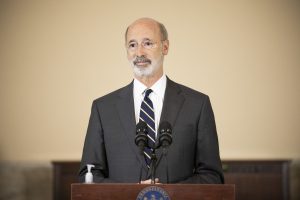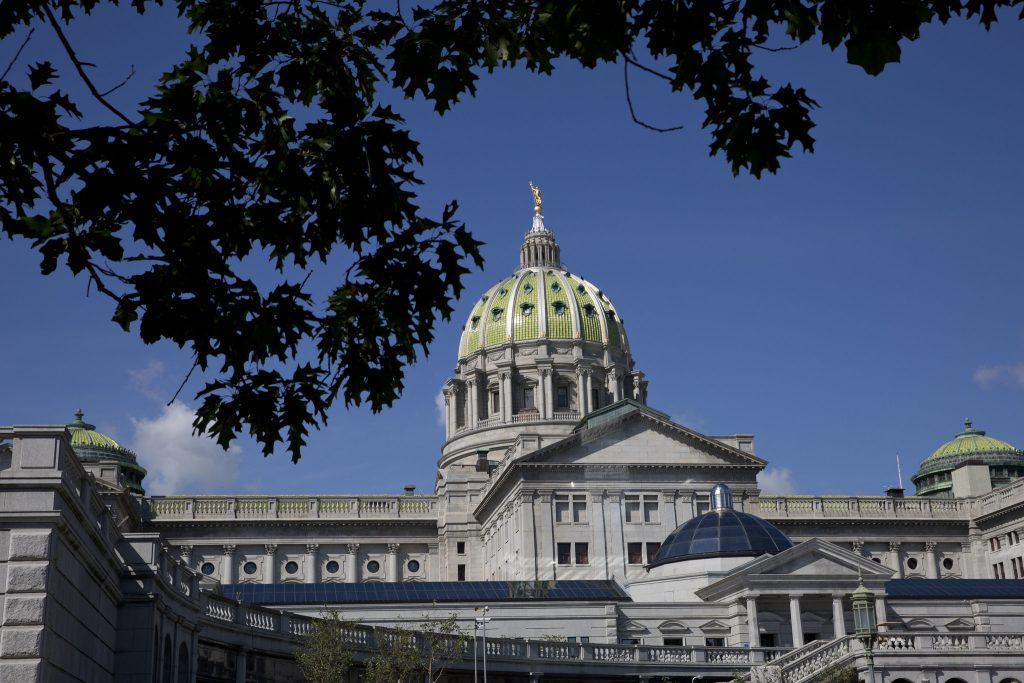Stephen Caruso of Spotlight PA and DaniRae Renno for Spotlight PA
Spotlight PA is an independent, nonpartisan newsroom powered by The Philadelphia Inquirer in partnership with PennLive/The Patriot-News, TribLIVE/Pittsburgh Tribune-Review, and WITF Public Media. Sign up for our free newsletters.
HARRISBURG — After five years of relatively smooth budget dealmaking, Pennsylvania’s state spending plan is more than two weeks late, and lawmakers have not publicly said how they might move forward.
The exact effect of a fiscal delay differs from year to year. A budget late by a week barely causes a wrinkle in state operations and has more of a political impact than a practical one.
But the impact of an impasse is immediate and lasting. Communication stalls. Coalitions collapse. Bills get stranded in inboxes and committees.
This year’s delay is unusual. It arose after Democratic Gov. Josh Shapiro said he would reject a section of the main budget bill that would create a state-funded private school voucher program.
Both bodies of the legislature have passed the bill, but Republican leaders in the state Senate — smarting from Shapiro’s abandonment of vouchers after publicly supporting them — have refused to reconvene the chamber. Until they do, the state’s lieutenant governor cannot sign the bill and send it over to Shapiro.
Lawmakers are still talking through the budget’s next steps, but aren’t scheduled to take any votes until September. As the breakdown threatens to last weeks, if not months, revisiting Pennsylvania’s past impasses can show how residents and government operations could be affected in the coming weeks
Budget impasses used to be a feature of Pennsylvania’s regularly divided government, which is legally obligated to pass a balanced budget by June 30 each year. In the past 20 years, the state has passed 13 late budgets, including four impasses that went over 100 days.
Drawing a throughline between all of them is difficult. Spotlight PA talked to seven Capitol insiders who’ve participated in high-level budget talks, some of whom requested anonymity to speak candidly, to learn how the current stalemate fits into this tradition.
A couple of constants stand out.
For one, length matters. Since 2009, lawmakers and state employees have been able to get paid during impasses, but they still have run into problems when stalemates have lasted so long that constituents were directly and negatively affected.
And second, there’s no hard and fast rule for what causes a tough budget year — sometimes it’s divided government, sometimes it’s a deficit, and sometimes it’s a plain old personality conflict.
The financial impact
When the commonwealth’s spending authority lapses for months, finances of local governments and nonprofits that rely on state resources to provide public services start to bleed dry.
The poorest public schools tend to bear the brunt of an impasse.
During the commonwealth’s record-setting nine-month impasse in 2015 and 2016, schools had to cancel tutoring, elective classes, and some extracurricular activities. A spokesperson for the Pennsylvania School Boards Association told Spotlight PA earlier this month that “as state subsidies are not flowing in, school districts still need to find money to pay salaries, utilities, and other mandated costs.”
State-subsidized pre-K programs were forced to temporarily shut down until a budget was passed in 2015-2016, which left some parents without child care. State-funded domestic violence centers dealt with short-term closures as well.
Also affected are students at the commonwealth’s four state-related universities: Lincoln Penn State University, Pitt, and Temple. During the 2015-16 budget impasse, students waited months to receive their in-state discount, which forced them to take out higher loans until funding cleared.
Until 2009, there was another impetus for lawmakers to pass a timely budget: State employees, including lawmakers themselves, wouldn’t be paid during an impasse.
A state Supreme Court ruling that year added state employee paychecks to the list of legally protected spending. State employees now must be paid, budget or not, which also means state prisons, driver’s license centers, and state parks operate as usual.
Insiders were split on how the ruling has since impacted negotiations. Capitol veterans familiar with budget negotiations under former Democratic Gov. Ed Rendell, who was in power from 2003 to 2011, noted that the governor seemed keenly aware of the tension that weeks or even months of unpaid state workers and unmet public services could create. This unease took several forms, including constituent phone calls, emails, and picket lines.
“Those are a lot of pressure points that don’t exist now,” Jake Corman, a former Republican state Senate leader who served from 1999 to 2022, told Spotlight PA. The ruling that requires state workers to be paid during an impasse “allows budget battles to last a lot longer,” he said.
Others argued that the burdens of an impasse have simply shifted from the state to the local level — specifically counties, school districts, and nonprofits.
Rendell told Spotlight PA that after the court case the loudest call was for his administration to fund public schools.
“Our message was, ‘Of course you have education money,’” Rendell said, referring to a school district’s local taxpayer funding versus state-provided dollars. “Our share of school funding was 38% to 40% at most. They had to have 60% not reliant on us and if that’s the case, the only time you should worry is in the seventh month without a budget.”
Still, Rendell maintains that the media cared more than the constituents about budget impasses.
“When I ran for reelection, I had four straight budgets that were overdue and I got reelected by 20 percentage points,” Rendell said. “Obviously the people … were more interested in what the budget did.”

The politics
In 2023, with billions of surplus dollars in the state’s coffers and a school funding system that a court deemed unconstitutional hanging over budget talks, Shapiro is working with a one-vote Democratic majority in the state House and an entrenched Republican majority in the state Senate.
While divided governments tend to produce more budget deadlocks, even one-party control has led to a late budget amid differing priorities.
Budget deals are typically negotiated behind closed doors by the governor and each chamber’s majority leader and majority appropriations chair, or any of their respective top staffers. (Sometimes the minority party is brought in if the majority is split over the details and can make a few requests as well.)
The leaders negotiating a deal have had to contend with near supermajorities of the opposite party, or sat across from a friendly leader who controlled their chamber by a single vote.
Rendell, who dealt with a fully GOP-controlled legislature for all but two budget cycles, signed only one on-time budget. That was during his last year in office,, when Democrats controlled the state House. His longest impasse was in his first year, and lasted 176 days after the statutory June 30 deadline for the state to approve a new spending plan.
Former Democratic Gov. Tom Wolf presided over a record nine-month impasse in his first year, but then delivered on-time budgets throughout his second term amid higher-than-expected state revenues and an influx of federal COVID-19 stimulus dollars.
A late budget also doesn’t always indicate an impasse.
In between Rendell and Wolf, former Republican Gov. Tom Corbett worked with a Republican-controlled legislature every year, but still signed one budget 10 days late and line-item vetoed $72 million from the General Assembly’s own budget because legislators didn’t pass his desired changes to the pension system.
Last year’s budget was eight days late, but Wolf and top Republicans communicated throughout as they hammered out how to use billions in federal stimulus dollars.
Regardless of which party is in charge or who is in leadership, multiple Capitol sources acknowledged that each chamber has a unique dynamic amid budget talks.
The state Senate has been under near-continuous Republican control since the 1980s. In exchange for Republican priorities, chamber leaders have historically been willing to cut deals with Democratic governors on issues ranging from a minimum wage increase to creating a natural gas severance tax.
Observers and former insiders chalk that up to the state Senate’s smaller size (50 members versus 203) and longer terms (four years instead of two), which they argue make the chamber’s lawmakers easier to keep in line and insulated from electoral pressure.
The state House, meanwhile, is bigger and harder to corral, and its many competing factions and ideologies within and between the parties make it harder to find consensus.
The dynamics of 2023
This year’s budget negotiations have ostensibly broken down over one issue: school vouchers.
During his campaign for governor, Shapiro said he supported using taxpayer money to create scholarships that would allow public school students to attend private institutions.
His administration doubled down on that support in the lead-up to the budget deadline, and state Senate Republicans included such a proposal — with a $100 million price tag — in the main budget bill the chamber passed.
But Democrats who control the state House balked, and the caucus as a whole declared it would not pass a budget that included private school vouchers. Shapiro then announced he would line-item veto the voucher proposal if the bill reached his desk — excising the measure while keeping the rest of the budget intact.
Both in public and private, state House Democrats have insisted that Shapiro backed them up during this year’s closed-door negotiations.
“It was made very clear by both myself, as well as the governor, that there was no deal until the House Democrats had agreed,” state House Majority Leader Matt Bradford (D., Montgomery) told reporters last week.
But the persistent Capitol chatter leading up to the deadline, particularly within the Harrisburg lobbying community, was that Shapiro and state Senate Republicans planned to cut a deal without the state House, then dump it in House lawmakers’ laps.
Shapiro would then be charged with wrangling votes within the state House to pass the budget. Three Capitol sources noted that such a plan was traditionally how things have worked.
“If anyone tells you they had the Senate getting Rozzi’d on their bingo card, they are a damn liar,” quipped one veteran Capitol observer to Spotlight PA, comparing Shapiro’s veto promise to state Rep. Mark Rozzi’s (D., Berks) two-month speakership in which he accepted, then reneged, on a GOP deal.
Through a line-item veto, governors can remove funding from specific parts of the budget but cannot add anything. While these vetoes have grown in popularity among governors in the past 20 years, legislators aren’t as keen on the idea.
The past three governors used a line-item veto to end an impasse. Governors accepted the deal that legislators sent them under the condition that they would nix pet projects. For Rendell, the key to that approach was ensuring Republicans knew about an impending line-item veto beforehand, he told Spotlight PA.
“Harrisburg is almost always going to be a divided government,” Rendell said. “So you’ve got to be straight up and not play games with the opposing party.”
“I don’t think Josh [Shapiro] was playing games,” he continued. “He just didn’t realize that the Democrats would be so adamant against increasing money for vouchers.”
Sources said that one budget’s unfinished business lays the groundwork for the next budget’s compromise.
Under Wolf, for instance, stalled conversations on changing pension policy or privatizing liquor sales in the 2015-16 budget bore fruit later in his term in the form of an omnibus bill giving state employees 401(k)-style retirement plans and allowing wine and beer sales in grocery stores and gas stations.
For now, the soil is still being tilled. Negotiations are ongoing among the Shapiro administration, state House Democrats, and state Senate Republicans to bring the chambers back, sign the budget, and pass critical companion legislation known as code bills.
As of July 17, there hasn’t been a breakthrough.
Quipped one former legislative aide: “This budget process is gonna leave a mark.”
But sometimes, sources argued, a standoff signals a reset that helps move all the parties closer to a deal.
“In my experience, there would be days of very productive conversations,” Mary Isenhour, Wolf’s former chief of staff, told Spotlight PA, “and then there would be days where everybody would go back to their corners and not talk.”
And with at least three, and potentially seven more budgets to come, Corman said that Shapiro, state House Democrats, and state Senate Republicans should prioritize rebuilding trust.
“Tom Wolf said no to me a lot. I didn’t like it all the time, but we dealt with it,” Corman said. “It needs to get repaired because you have future issues to work on together.”
DaniRae Renno is an intern with the Pennsylvania Legislative Correspondents’ Association. Learn more about the program. Spotlight PA is funded by foundations and readers like you who are committed to accountability journalism that gets results.




